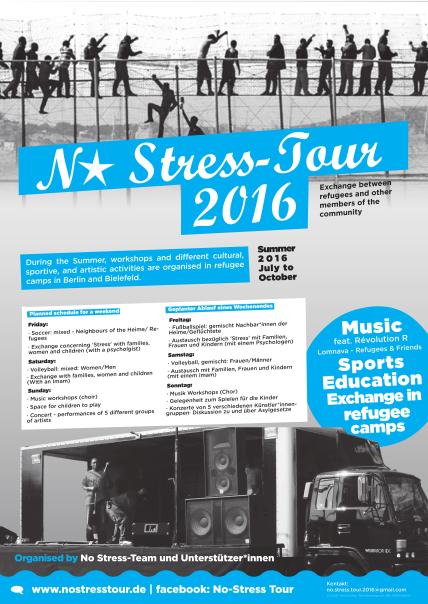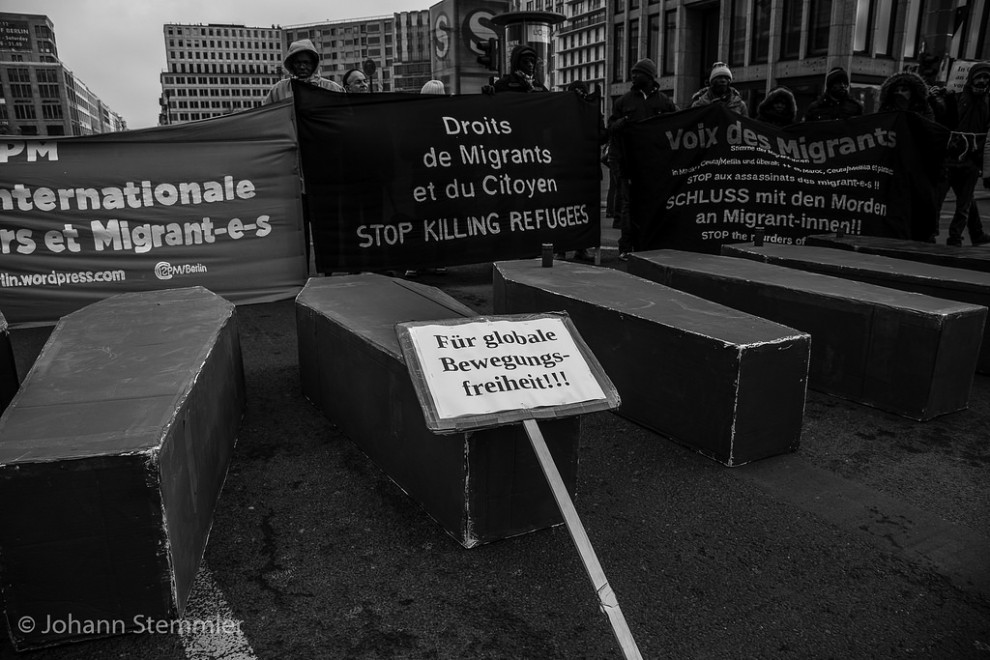
No Stress Tour Poster
Summer is the time when lots of things are happening in Germany, also in and around Berlin. People profit of the sun, they become more active and open up. This offers opportunities, particular for refugees, to think of new strategies to build up a better communal life.
For this reason CISPM and Afrique Europe Interact, international networks for emancipation and integration of refugees, are planning a project called „No Stress Tour“, which should take place this summer from July until October.
The aim of the project is to bring refugees and other inhabitants of the city closer to each other and to provide support with regard to the current complex asylum policy.
Despite the willingness of refugees, to open up to other residents and the willingness of other citizens to reach out to refugees, we noted that there are still barriers, based on anxious informations. „Refugees are rapist, suicide assassins or simply undesirables and Germans are historically radical racists“
– this opinion, which is based on individual cases and is used for the electoral game influences the public opinion, causing despotism on one side and stress among others . As the „No Stress Tour“ is primarily organized and planned by persons which are themselves refugees and European citizens, they will also directly or indirectly profit from the benefits the project offers.
Because of its flexibility, the „No Stress Tour“ facilitates the exchange between refugees and other inhabitants of the districts and sensitizes people on issues such as the controversial asylum policy, with special focus on the emancipation of women and children.
To achieve our goal, we will organise weekends full of activities in various refugee camps from July to October, which will be carried out in two camps each month in or around Berlin and Bielefeld.
Invited are in particular refugees, citizens of the concerning districts, doctors and lawyers for refugees, mayors, socially active groups and people with migration background.
The various activities are adressed to all the persons directly concerned.
To the citizens of the districts, to all refugees and particular to all woman and children.
Planned weekend schedule for the „No Stress Tour“:
Friday:
· soccer: mixed: Neighbours of the Heime/ Refugees
· Exchange concerning ‘Stress’ with families, women and children (with a psycholgist)
Saturday:
· volleyball: mixed: Women/Men
· Exchange with families, women and children (With an Imam)
Sunday:
· Music workshops (choir)
· space for children to play
· concert – performances of 5 different groups of artists

Besides the fact that we want to bring the citizens closer to refugees and at the same time to show refugees that there are people supporting them in their rights, we also want to conscientize and enforce women who particularly live in a difficult situation facing special troubles being women, as well as we want to conscientize children in their right to education.
Due to the participation of the refugees themselves and locals, we expect this poject to be very promising.
But of course the activities which will take place directly in the camps throughout the hole
weekend require financial support.
We hope to establish a good atmosphere between all inhabitants in order to continue and to improve the project in the next years.
Contact us:
no.stress.tour.2016@gmail.com
Facebook: No Stress Tour
Be part of our Team:
Each Sunday, 16:00-18:00h,
Seminarraum next to Café Kotti, Adalbertstr. 4 (U8 Kottbusser Tor)
Organinised by: The No-Stress Team and supporters
Support us :
Borderline-europe e.V ; Bank : Gls Gemeinschaftsbank; Purpuse : No Stress Tour
IBAN: DE54 4306 0967 4005 7941 02 ;
BIC: GENODEM1GLS
